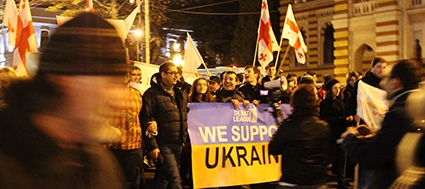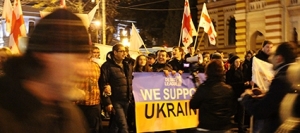Imported Leaders: How the Internet Makes International Citizenship Possible
(Or How the Ex-President of Georgia Got a Political Position in Another Country’s Region almost the Size of his Home Country).
Globalization of human resources is not a new issue. Open borders, ease of travel, the European Union, internationalization of languages, and then the internet, make it very easy to import or export personnel – from a plumber to a CEO. But the World Wide Web is now bringing a new trend: moving political powers across state borders as it never has before.
Many recent studies have proved that the existence of social media supports civic activity and public participation processes. As digital internet media brings new features to people’s social participation and culture, it also changes the way civil agencies interact with the public and, therefore, the way political relationships work. The number of books written on the Facebook and Twitter revolutions emphasizes that these tools have made community mobilization more comfortable.
This gives us an idea that the possibility of active participation in some civil or political processes, while not being officially affiliated to one or another group or organization, may be attractive to citizens of post-communist countries. The degree of independence and voluntarism of associations effects the level of democracy of internal decision-making. While in western democracies social media and web 2.0 are mechanisms of wider and faster communication, in post-communist societies, where civil activism is relatively young, online communities have become a stage for more political and civil activism.
In 2004 Facebook did not exist. Georgians watching the Ukrainian Orange revolution live on TV were supportive, interested and appreciative. But unless they met Ukrainians, they could not share or discuss their opinions and impressions. In November 2013, Ukraine drew international attention once again. This time around we were able not only to comment and share information, but could offer support to one side or another. We could send money to the Maidan fighters, quickly organize various protests in front of embassies, and ultimately we could spread our own word about our concerns abroad. Whether here in Tbilisi, or in Hannover, anyone could become engaged in the political processes of another nation.
Since winter 2014, 36 demonstrations have been organized by different non-governmental, political or civil groups in Tbilisi. One of them (held in August 2014 on the day following Russia’s impertinent moving of its military forces into Ukrainian territory) was called by just a handful of students and one civil activist. Yet this very protest caught the eye of CNN. The video showing the burning of Putin’s portraits uploaded to I-report was broadcast on CNN the same day and collected more than 33,000 views. It is still a question for research to what extent such international civil actions make a real difference, but at least in this case we felt like participants ourselves. We did not need to ask for rights and we did not need to become citizens of a country in order to influence the politics there.
Communicating through barriers is obviously easier when you’re multilingual. The Soviet past and experience of being a part of the Russian Empire has left its footprint and even today the majority of the adult population of post-Soviet countries can still communicate in Russian. The quality of understanding between us was also predestined by mutual history - belonging to one empire predetermines the sharing of not only problems but attitudes and values as well.
How could the political leader of one country become accepted by society in another?
It seems that for the first time since the days of the Tudors and Habsburgs, we are witnessing the political leader of one independent state gaining political power in another. Here, we will not discuss personality or any of the alleged unique skills of an ex-president of Georgia. We will focus on that little tool that helped to make this makeover possible. Public space where public opinion could be constructed ‘online.’ Internet is free and even language barriers, thanks to the “google translate” option, cannot stop us from reading and commenting any more. Politics is largely influenced by the online sphere which seems to be getting more and more global.
In 2011, recognizing the importance of the FB-oriented audience, Mikheil Saakashvili became an active FB user and his page became his key media tool right after he left the office and the country at the end of 2013. Despite the low frequency of his appearances on national TV channels, which are still recognized as the main source of information for the majority of Georgians, he managed to remain in the public eye. His Facebook audience increased by 100% in one year, but of course these are not all Georgians. In May 2015, NDI published the results of its study in Ukraine. One of the questions looked at citizens’ attitudes towards the western or eastern integration of the country. Odessa appeared to be the least western-oriented town in the country among the 18 surveyed.
So, how did Mikheil Saakashvili, who is known as an active pro-western politician, become enormously popular in the Odessa region the day following his appointment as Governor there?
Many prominent active or retired European and American politicians expressed their support and visited Ukraine during the Maidan revolution. That said, how many other examples of active political career extension in other states could we find?
Perhaps in the online public sphere, the ability (or impression of ability) to interact with the leader, the informal style of his communications and the intensity of his responsiveness to the online community’s concerns play a role here. Certainly, the degree of Georgian involvement in online support and discussion of Ukrainian events brought the societies closer to each other. The availability of information from different sources about the Georgian experience and open discussion about the pros and cons of the reforms boosted Ukrainians’ interest and trust in the ex-president.
The Maidan revolution, which changed the history of modern Europe, started with a single twitter post by a blogger and it went on to become a worldwide topic for months. Social media was the driving force of all civil movements during the Maidan winter showing us that globalization of the public sphere within online social communities has brought its first clear political innovation.
Lana Gvinjilia is the Head of PR at the Saakashvili Presidential Library.
Lana Ghvinjilia












